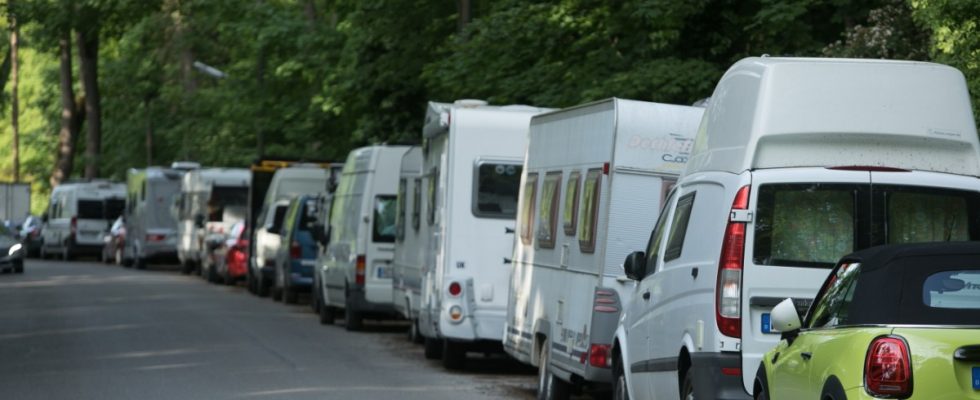Difficult to say where the longest queues have formed this spring. Ludwigshöher Strasse, Conwentzstrasse, Siemensallee and Kriegerheimstrasse are certainly high up in the table. Along the edges of these traffic routes, tens of meters of camper vans line up next to camper vans, boat trailers next to trailers, caravans next to buses that are ready for the scrap heap. This is a nuisance for some residents, because the permanently parked vehicles rob them of a clear view and parking spaces for their own cars. And the problem is getting worse and worse.
The number of registered mobile homes has been increasing rapidly for several years. It has more than doubled in Munich since 2019, to around 15,000. Nationwide, 300,000 motorhomes and caravans have been newly registered in the past three years. The trend has been demonstrably accelerated by the tourist restrictions imposed by the corona pandemic. Camping in every form was suddenly back in vogue.
The boom in “mobile homes” in particular has consequences, which are clearly visible not least on the edges of many inner-city streets, where parking is free. Vehicles of this type now occupy public traffic areas to an extent that has led to heated discussions in many parts of the city. There is hardly a district committee, hardly a police station in the state capital that has not repeatedly dealt with the problem.
Some citizens, such as Nicole Mangold from Solln, took the initiative themselves to curb the rush of trailers on public roads. Mangold started an online petition a good two years ago; which has been signed almost 2000 times. The declared goal of the action: an increase in the fine for parking violations, “more consistent controls by the police” and more explicit parking bans.
Some caravans are already gathering dust in their parking lot
With the parking bans, however, that’s a thing. From a purely legal point of view, mobile homes are not to be treated any differently than parked cars. They can therefore be parked indefinitely where this is not expressly forbidden. And all the other unpopular vehicles, whether with Munich or other license plates, can remain in one place for 14 days without being moved. After that, a slight change of location is sufficient, and the period starts all over again. The police, for their part, have a trick up their sleeve to register violations of the moderately effective regulations: they use the position of wheel valves as a guide. But the usual fine of 20 euros does not seem to scare the vehicle owner. You can tell from the thickness of the dust on some caravans that they have been on the side of the road for months, if not years.
The Sendling-Westpark district is using an unusually drastic means of curbing the long-term parking of larger commercial and leisure vehicles. The district committee there has long had a thorn in its side that caravan owners are taking over Inninger Straße. Therefore, the district committee is pushing for the dismantling of the roadway. The goal is partial unsealing and greening instead of permanent pavement. Huge roadside construction containers currently serve the purpose of locking out trailers and similar unwanted vehicles. The district committee has been working towards this solution for a long, very long time. A few hundred meters further, on Zielstattstraße in Obersendling, however, it becomes apparent that the visitation could only have shifted.
Seasonally, the invasion problem intensifies, for example when convoys of Italian mobile homes invade Munich during the Oktoberfest. But they’re gone after a few days. In summer and in winter, local lovers of camping on wheels remain. And they’re hard to get to. There are certainly ways for them not to become a public nuisance. Because both in the city and in the surrounding area, landowners offer mobile home parking spaces for rent. The prices are often below those of a garage. Switching to a campsite like the one in Thalkirchen is more expensive. One way or another, a bigger shortcoming is often the distance from where you live.
What should appeal to lovers of holiday homes on wheels and other large vehicles that are only used occasionally is just as much as the lax traffic rules in this country: the relaxed attitude of many Munich residents and their local politicians shrugging their shoulders on this topic. Tenor: Things have to be somewhere. Especially in places where residential development is sparse, such as in parts on Drygalski-Allee or Höglwörther Strasse, people don’t really see a serious problem in the long-term parkers.

